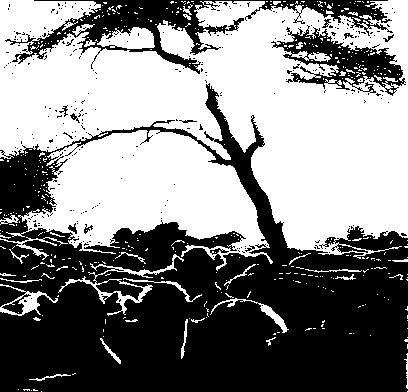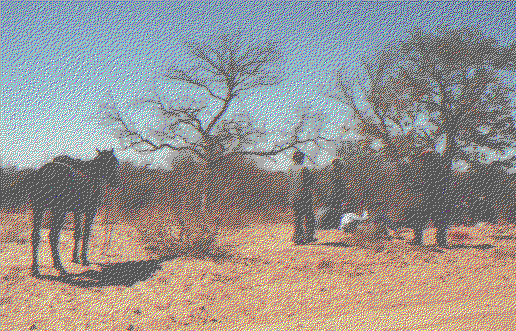Stories from Botswana:
The Last Cattle Trek
By Jürgen Duenbostel
More than hundred years ago it was the great time of the cowboys
driving cattle across the prairies to the slaughterhouses in St. Louis or
Chicago. Until the railways made their work obsolete. But still such treks
exsist today. In Botswana in southern Africa black cowboys drive cattle some
500 Mile across the Kalahari to the abatoir in Lobatse.

The campfires have shrinked to just a little flickering.
Clear sky keeps the air chilled. Here, in the mids of the
Kalahari desert, in the center of Botswana, the former
British Betchuanaland, the galaxy and the Southern Cross are
shining brighter than elsewhere. Not a single sound reaches
the ear.
But suddenly one of the horses snorts startled and
immediately everybody is wide-awake. Maybe the leopard is
prowling around the camp. The Bushmen, who serve as cowboys
and drovers for this trek, had discovered its tracks the day
before. "Hay!" , "hoo!", "ha!"
they shout to scare away the big cat and to calm down the
cattle.
Some 500 bullocks and 300 cows belonging to farmer John
Kempf - worth half a million dollar - are going on this
trek. Some 500 miles in southern direction they are driven
across the Kalahari desert to another farm in Bray close to
the South African border. There they will be fed for a few
month and then will go to the slaughterhouse in Lobatse
which is the largest abatoir in Africa.
 |
This night the cattle is kept in two kraals which the trek
leader Wynand Kotze and his men made the day before from
brambles. But even the most stinging thorn could not keep
the beasts from stampeding if they are scared to death.
"In that case", Wynand explains, "the brutes
trample down everything which comes in their way and then
they hurt themselves. But injured and scattered animals are
an easy prey for the lions, leopards or hyenas."
In the meanwhile the Bushmen have given the fires a stire to
create heavy smoke in order to outdo the stench of the
predator, because nothing could keep the cows calm in case
they smell it.
|
"The lions sometimes make use of their smell for
hunting" Wynand reports, "or I better say the
lionesses, because they have to do the work, the old lions
are pashas and like to be served. A single lioness then
approaches the kraal with the wind from behind so that the
cattle can smell her. If the brutes in fear stampede out to
the opposite direction the other lionesses are waiting there
already to kill one or two scattered animals."
|
The next morning soon after leaving the kraal, despite all
the precautions it almost would have happened. Suddenly the
bullocks went wild and started to run like crazy. Hardly the
cowboys with their horses could stop them.
"A hyena has
been here during the nigth!" shouts a bushman who
examined the place where the cattle got frightened.
"The bullocks could still smell the scant."
| Listen, what
happened)
(240k *.wav-file, needs soundcard + audio-plugin) |
|
"These people know the Kalahari, its vegetation, its
wildlife and the tracks like nowbody else", comments
Wynand Kotze, "they even know a remedy against the bite
of the black mamba". The black mamba is a snake which
can kill within minutes.
Wynand likes to hire Bushmen for the work during the trek.
He is a Boer having grown up in Ghansi, a provincial city in
the middle West of today's Botswana. For about a hundred
Years Boer settlers have been living there. When Wynand was
a child he used to play with the kids of the Bushmen and
thus he learned their language with those many complicated
click-sounds. Wynand appreciates the Bushman tradition and
their skills. "Unfortunately", he says a litle
said, "much of their knowledge will soon be lost
forever, may be alredy in the next generation."
| 
Listen to the San (bushmen)
talking with click-sounds
(100k
*.wav-File, needs audio-plugin) |

The thumb-piano
of the San
Listen to the sound!
(200 k *.wav-File,
needs sound-card and audio-plugin)
|
Today there are hardly any Bushmen left who can live
according to their traditional way as normads hunting and
collecting. Most of them are settled in permanent villages
now, survive by occasional odd jobs or are just unemployed.
Few of them can cope with the modern commercial world. Marx
and Lenin however could have learned by them what pure
communism means. The Bushmen share among each other whatever
they posses. If you donate a shirt to one of them, you may
see the next day already somebody else in that new shirt.
"The other one had no shirt at all", will the
first one explain, so it was natural for him to give the
shirt away.
For hundreds of years the Bushmen have been subjugated by
other tribes and nations. Chased away from fertile lands
they had to learn how to survive in the scanty and dry
Kalahari. They even lost their original name. Bushmen they
are called by the Boers. In the Setswana language of
Botswana they are named Basarwa, which means people of
wilderness. The scientists designate them as San. When the
first European arrived in Africa the Khoi-khoi-tribe who
took San as servants called them by this name. Translated it
means "the people who gather their food".
|
The San like to work as cowboys or drovers for the trek. The
pay there is better than the usual and they receive always
good food during the march: sorghum, corn, beans, from time
to time even meat. But above all they like in the middle of
the Kalahari to get away from that world which we say it is
progress. In the the evenings at the camp fires they tell
their ancient tales again and again and enjoy it.
Wynand Kotze too sleeps at the fire under open sky.
"The fire is our home here in the Kalahari", he
says.
Meanwhile the cattle got used to the routine of the trek.
When it is time for the lunch break the animals stop by
themselves and graze or rest. And in the evening they go
into their kraal without hesitation. It was different in the
first days of the trek. Then the cowboys had always to slow
them down, because they tried to run ahead and then return
in a large circle to their farm.
It takes more than a month before the trek arrives at its
point of destination. But despite that the cattle won't go
hungry. There is enough to feed on in this part of the
Kalahari which resembles more a savanna than a desert. The
few rains in the summer season are sufficient to keep fresh
gras growing. Then the gras dries very fast in the heat and
thus keeps all its proteins like very best hay.
But lack of water is always a big problem during a trek. The
trek leader has to plan the daily distances very carefully,
to be able to water the cattle just on time. In the days
gone by treks could only leave during the rainy saison when
there is always some water in small ponds throughout the
Kalahari. Well, not always. It happened that the rains
failed to fall at the end of a trek and then a whole herd
could die by thirst.
Since several years things have become easier. The Botswana
government has drilled boreholes along the trek route.
Diesel engines pump up fossile water from several hundred
meters below the sands. But from time to time such a pump
quits its function and the borehole runs dry. With his four-
wheel-drive Wynand therefore always goes ahead to check the
pumps. If they don't work he has to be his own mechanic.
It's not easy to bring the thirsty cattle to the waterplace
after several days of dry walk. The beasts can smell the
water from a distance of several miles. They would start to
run and hurt themselves in the rush to the borehole.
Therefore, when the wind comes from the well, Wynand leads
the cattle in a huge circle around the waterplace. Only with
the wind from behind small groups of cows or bullocks one by
one are brought to the water. "If I see how they drink
after several days of wearisome walk I feel myself much
better", Wynand says. He has learned the secrets of the
trekking by his father with whom he already went as a litle
boy across the Kalahari.
But soon the days of the treks will vanish. Already now most
of the cattle is loaded on lorries on the farms and driven
on these trucks over a dustroad to the slaughterhouses.
Because of the poor road this method of transport still is
more expensive than trekking the cattle. But the Botswana
government has begun to pave the road with asphalt. As soon
as that is finished the transport by truck will be cheaper.
And then in Africa too the great time of the cowboys will
have gone. Without a farewell celebration. Only after some
time people will remark that there are no treks any more.
May be this one already has been the very last cattle trek.
You want to read another story about a Dream Marriage with a late Wife?
Klick here:
Dream Marriage



